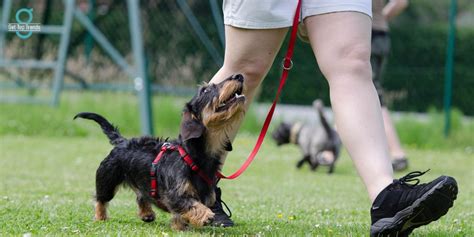There is a certain magic that surrounds the idea of welcoming a furry friend into your life, a magic that sparks excitement, joy, and a sense of fulfillment. For many, it is a lifelong dream to share their existence with a loyal and loving canine companion. The allure of a wagging tail, wet noses, and endless cuddles brings a unique happiness that cannot be replicated elsewhere.
Yearning for the companionship of a four-legged friend is not simply an idle fantasy; it is a deep-rooted longing that resides within the depths of our souls. For some, this desire is intertwined with nostalgia, reminiscent of cherished childhood memories spent playing fetch or cuddling with a beloved pet. For others, the longing comes from a place of longing, seeking solace and unconditional love that only a dog can provide.
And yet, as we float through the realms of our imaginations, perched on the precipice of joyous anticipation, we must remember that owning a dog is not simply a whimsical dream; it is a lifelong commitment, teeming with responsibility, love, and dedication.
When contemplating the fulfillment of our canine aspirations, it is crucial to approach it with a clear mind and an open heart, understanding that the journey will be filled with both blessings and challenges.
Advantages of Dog Ownership: Why You Should Consider Getting a Companion

Having a furry companion by your side can bring numerous benefits to your life, enriching it in ways you may not have imagined. From providing unwavering loyalty and companionship to improving your overall well-being, owning a dog offers a range of advantages that make it worth considering as a pet. In this section, we will explore some compelling reasons why you may want to open your heart and home to a canine friend.
- Unconditional Love and Companionship: Dogs are known for their unwavering love and loyalty towards their owners. They create deep emotional connections and make wonderful companions, offering constant support and comfort through life's ups and downs.
- Improved Mental and Emotional Well-being: Research has shown that owning a dog can have significant positive effects on mental and emotional well-being. Interacting with dogs can help reduce stress, anxiety, and feelings of loneliness, while promoting a sense of happiness and contentment.
- Increased Physical Activity: Dogs need regular exercise, which means you will have a constant motivation to stay active and engage in physical activities. Regular walks, play sessions, and outdoor adventures with your dog will help improve your fitness levels and overall health.
- Social Connections: Having a dog can facilitate social interactions and build connections with other dog owners. Walking your dog in the park or participating in dog-related activities can provide opportunities to meet new people and potentially develop lasting friendships.
- Teaching Responsibility and Empathy: Caring for a dog requires responsibility, patience, and empathy. Owning a dog can teach valuable life skills, especially to children, by nurturing a sense of accountability, compassion, and respect for all living beings.
- Enhanced Security: Dogs can act as a deterrent to potential intruders or provide a sense of security to individuals living alone. Their keen senses and protective instincts can offer peace of mind and make you feel safer in your home.
Consider these advantages of dog ownership to see whether the joys and benefits outweigh the responsibilities. Owning a dog is a commitment that requires time, effort, and financial resources, but the rewards of unconditional love, companionship, and improved well-being make it a decision well worth considering.
Exploring the Emotional and Physical Benefits of Canine Companionship
Having a furry four-legged friend as a pet can bring about numerous emotional and physical benefits. It's undeniable that owning a dog can greatly enhance our lives in various ways, providing us with companionship, love, and support. Not only do dogs offer unconditional love and loyalty, but they also serve as excellent stress relievers and can improve our overall well-being. Let's delve into some of the compelling reasons why having a dog can be incredibly rewarding.
- Emotional Support: Dogs have an innate ability to sense our emotions and provide comfort during challenging times. Whether you're feeling sad, lonely, or stressed, a dog's presence can instantly lift your spirits and offer solace. Their unwavering companionship and non-judgmental nature create a sense of emotional support that is difficult to find elsewhere.
- Physical Fitness: Owning a dog can significantly increase your physical activity levels. Regular walks, jogs, or play sessions with your furry pal not only benefit their health but also help you stay active and fit. Dogs can motivate us to establish a consistent exercise routine, leading to better cardiovascular health, improved muscle tone, and increased energy levels.
- Mental Stimulation: Dogs are highly intelligent creatures, and owning one requires mental engagement. From training sessions and puzzle games to problem-solving activities, dogs provide mental stimulation that keeps our minds sharp and active. This can be particularly beneficial for individuals looking to challenge their cognitive abilities or maintain mental acuity as they age.
- Social Interaction: Dogs are excellent icebreakers and can facilitate social interaction with other pet owners and dog lovers. Walking your dog in the park or participating in dog-related events and activities can lead to new friendships and connections. Having a dog can help reduce feelings of loneliness and increase opportunities for socialization, which is essential for our overall well-being.
- Reduced Stress and Anxiety: Interacting with dogs has been proven to lower stress and anxiety levels. Petting a dog releases oxytocin, a hormone associated with happiness and relaxation, while also reducing cortisol, the stress hormone. Dogs provide a sense of calmness and can alleviate symptoms of anxiety and depression, making them valuable companions for individuals dealing with mental health challenges.
These are just a few of the many emotional and physical benefits that come with having a dog as a companion. Their unwavering loyalty, affection, and ability to improve our overall well-being make them more than just pets – they become beloved members of our families, enriching our lives in countless ways.
Picking the Perfect Pup: Discovering the Ideal Canine Companion for Your Lifestyle

When it comes to finding the perfect four-legged friend to join your life, it's important to consider a variety of factors. Choosing the right breed to match your lifestyle is crucial in ensuring a harmonious and fulfilling relationship for both you and your new furry friend. While each breed possesses its own unique characteristics and temperament, finding the one that aligns with your interests, living situation, and activity level is key.
First and foremost, it's essential to evaluate your activity level and the amount of exercise you can provide to your future canine companion. Some breeds thrive on high-intensity activities, such as running, hiking, or playing fetch, while others may prefer a more relaxed lifestyle. Assess your daily routine and determine whether you have the time and energy to dedicate to regular physical activity with your pup.
Additionally, it's crucial to consider the size of your living space when selecting a breed. Certain breeds, such as Great Danes or Saint Bernards, may require ample room to roam and play, while others, like Pugs or French Bulldogs, are more adaptable to smaller living quarters. Ensuring your living environment can accommodate your chosen breed's size and activity needs will contribute to a comfortable and happy living arrangement.
Furthermore, each breed has its own unique set of characteristics and temperaments. Some may be inherently energetic or sociable, while others may be more independent or reserved. Consider your preferences and desired traits in a canine companion. Do you envision a dog that will eagerly greet every stranger with a wagging tail, or one that will be a loyal and protective companion? Researching breed-specific traits can help you identify the ideal match for your personality and lifestyle.
Lastly, it's important to take into account any specific needs or allergies you or your family members may have. While all dogs require love and care, certain breeds may be better suited for those with allergies or specific sensitivities. Hypoallergenic breeds, such as poodles or bichon frises, are often a good option for individuals with allergies, as they have minimal shedding and dander.
Remember, finding the right breed for your lifestyle is a crucial step in ensuring a long-lasting and fulfilling relationship with your future furry friend. By assessing your activity level, living space, desired characteristics, and any specific needs, you can make an informed decision that will lead to a lifetime of happiness and companionship.
Finding the Perfect Canine Companion for Your Family's Needs and Abilities
When it comes to adding a furry four-legged friend to your family, it's important to find a canine companion that suits your specific needs and abilities. Each family is unique, and so is each dog. By understanding your family's lifestyle, preferences, and capabilities, you can make an informed decision and find the perfect match.
| Factors to Consider |
|---|
| Size |
| Activity Level |
| Temperament |
| Training Needs |
| Grooming Requirements |
| Breeds to Explore |
| Shelter Adoption |
One of the first factors to consider is the size of the dog. Depending on the size of your living space and your family members' preferences, you may lean towards a small, medium, or large breed. Similarly, understanding the activity level of different breeds can help ensure compatibility with your family's activity level and exercise routine.
Temperament is another crucial aspect to factor in. Some families may prefer a more laid-back and easygoing companion, while others may find joy in an enthusiastic and energetic dog. It's important to assess your family's ability to handle different temperaments and find one that complements everyone's personalities.
Training needs should also be taken into account. While some families might have the time and patience to dedicate to training a puppy, others may prefer a dog that is already well-trained or more independent. Consider the level of commitment your family is willing to make to ensure a well-behaved and obedient companion.
Grooming requirements vary greatly among different breeds. Some dogs may have low-maintenance coats, while others may require regular brushing, grooming, and even professional grooming services. Take into consideration your family's ability to handle grooming needs and choose a breed that aligns with your capabilities.
Exploring different breeds and their characteristics can help narrow down your choices. Research specific breeds known for their compatibility with families and consider their traits, health concerns, and lifespans. Remember that crossbreeds and mixed breeds can also make wonderful companions and often exhibit a unique combination of traits from their parent breeds.
Finally, don't forget to consider adopting from a shelter or rescue organization. Shelter dogs come in all shapes, sizes, and temperaments, and they are often in desperate need of a loving home. By adopting a dog, you not only provide a second chance for a deserving pup but also experience the joy and fulfillment of giving a forever home to a grateful companion.
So, when searching for your perfect canine companion, take the time to evaluate your family's needs and abilities. By considering factors such as size, activity level, temperament, training needs, grooming requirements, and exploring various breeds, you can find a dog that will seamlessly fit into your family and bring years of unconditional love and companionship.
Creating a Welcoming Environment for a New Furry Companion

Bringing home a new four-legged addition to your family is an exciting and joyous experience. Before your new pet arrives, it is essential to prepare your home to ensure a smooth transition. This section will provide you with helpful tips and advice on how to create a welcoming environment for your new furry family member.
One important aspect of preparing your home is to secure any hazardous items or areas that could potentially harm your pet. This includes placing locks on cabinets containing cleaning supplies, ensuring that any toxic plants are moved out of reach, and covering electrical cords or wires to prevent chewing accidents.
Additionally, you should designate a specific area in your home for your new furry friend. This could be a cozy bed or a crate, providing them with a safe and comfortable space to retreat to. It is important to make this area inviting and cozy by placing soft bedding, toys, and perhaps even a familiar item with their scent to help them feel secure and at ease.
Another crucial step in preparing your home is establishing a routine and rules for your new pet. This includes determining feeding times, potty training areas, and setting boundaries within your home. Consistency is key, as it helps your pet feel secure and understand what is expected of them.
Incorporating a de-cluttering process can also contribute to creating a pet-friendly environment. Remove any objects, such as small decorations or fragile items, that could be a potential hazard or easily knocked over by your pet. By minimizing clutter, you are preventing accidents and creating a safer environment for both you and your new furry family member.
| Helpful Tips: |
|---|
| 1. Provide interactive and engaging toys to keep your pet mentally stimulated. |
| 2. Consider investing in pet gates or baby gates to restrict access to certain areas of your home. |
| 3. Ensure that your home is adequately pet-proofed by covering open electrical outlets and securing loose cords. |
| 4. Introduce your new pet gradually to different areas of your home, allowing them to explore at their own pace. |
| 5. Provide multiple cozy resting spots throughout your home to cater to your pet's comfort and relaxation. |
By taking these steps to prepare your home, you are setting the stage for a successful and harmonious relationship with your new furry family member. Remember, creating a safe, welcoming, and stimulating environment is essential for your pet's overall well-being and happiness.
Tips for Securing Your Home and Ensuring a Smooth Transition for Your New Canine Companion
When bringing a furry friend into your home, it's important to prepare your living space to create a safe and welcoming environment for your new four-legged family member. Just like preparing a nursery for a newborn, dog-proofing your living space is essential to prevent accidents, keep your belongings intact, and ensure a smooth transition for both you and your new pet.
A key aspect of dog-proofing your living space is evaluating potential hazards and taking the necessary precautions to eliminate or minimize them. Dogs are naturally curious creatures, so it's essential to examine your home from their perspective. Start by identifying any toxic plants, chemicals, or medications that may be within your dog's reach and remove them or place them in secure cabinets or higher shelves.
| Tips for Dog-Proofing Your Living Space |
|---|
| Create a designated space for your dog |
| Keep electrical cords out of reach |
| Secure trash cans and food containers |
| Block off restricted areas |
| Safely store household chemicals and cleaners |
Designating a specific area in your home for your dog can help establish boundaries and provide a sense of security. This can be a dog bed, crate, or an entire room. Ensure this space is comfortable, well-ventilated, and contains the necessary supplies such as food, water, and toys.
Another important step is to keep electrical cords out of your dog's reach, as chewing on them can result in electrical shock or even a fire hazard. Utilize cord covers or tuck them away behind furniture to prevent your dog from accessing them.
Securing trash cans and food containers is crucial to prevent your dog from scavenging and potentially ingesting harmful substances. Invest in trash cans with secure lids and keep them in a dog-proofed area. Store all food items in secure containers or cabinets to avoid any unwanted snacking.
Blocking off restricted areas in your home, such as staircases or rooms that contain delicate items, will help prevent accidents and promote a smooth transition for your new pet. Use baby gates or other barriers to limit your dog's access to these areas until they are fully trained.
Lastly, storing household chemicals and cleaners safely is vital to ensure your dog does not accidentally ingest toxic substances. Keep these items in locked cabinets or high shelves that are out of your dog's reach.
By following these tips for dog-proofing your living space, you can create a safe and welcoming environment that will help both you and your new canine companion adjust smoothly to your life together. Remember, a few preventive measures can go a long way in ensuring the well-being and happiness of your furry friend.
From Fluffy Companions to Well-Mannered Companions: the Basics of Training Your Canine Friend

When you bring a new furry friend into your home, there is an undeniable sense of joy and excitement. However, it is important to remember that a well-behaved and obedient dog does not come naturally; it requires training and guidance. In this section, we will explore the fundamental principles of dog training and provide you with valuable insights on how to transform your fluffy bundle of joy into a well-behaved and respectful pet.
Training your dog goes beyond teaching them simple tricks or commands; it lays the foundation for a harmonious and balanced relationship between you and your canine companion. Effective dog training encompasses various aspects, including teaching basic commands, establishing boundaries, and addressing behavioral issues. By understanding these fundamentals and employing consistent and positive training techniques, you can shape your dog's behavior and create a rewarding and enjoyable living experience for both of you.
| Key Aspects of Dog Training |
|---|
| 1. Establishing Leadership |
| 2. Positive Reinforcement |
| 3. Consistency and Repetition |
| 4. Socialization |
| 5. Basic Commands |
1. Establishing Leadership: Dogs thrive in structured environments where they perceive their owners as leaders. By establishing yourself as a calm and confident leader, you can instill a sense of trust and respect in your dog, which is crucial for successful training.
2. Positive Reinforcement: Rewarding desired behaviors encourages repetition and reinforces the bond between you and your dog. Utilize treats, praise, and affection to reward your dog's positive actions, reinforcing the idea that good behavior comes with its rewards.
3. Consistency and Repetition: Dogs thrive on routine and repetition. Consistency in training methods and expectations is essential as it helps your dog understand what is expected of them. Regular practice and repetition of commands reinforce learning and help solidify behaviors.
4. Socialization: Exposing your dog to various environments, people, and other animals from a young age helps them develop confidence and adaptability. Proper socialization is crucial for a well-rounded and well-behaved dog.
5. Basic Commands: Teaching your dog basic commands such as sit, stay, come, and leave it forms the foundation for further training and communication. These commands promote obedience and safety, allowing you to keep your dog under control in different situations.
By focusing on these key aspects of dog training, you can nurture a strong bond with your dog while simultaneously guiding them towards becoming a well-mannered and obedient companion. Investing time and effort into training will yield tremendous rewards, enhancing the relationship and ensuring a happy and fulfilling life together.
FAQ
What are the benefits of owning a dog?
Owning a dog has numerous benefits. Dogs provide companionship and unconditional love. They can help reduce stress and anxiety, improve mental health, and promote a more active lifestyle. Additionally, having a dog can teach responsibility and provide a sense of purpose.
How do I know if I am ready to own a dog?
Owning a dog is a long-term commitment, so it's important to assess your readiness. Ask yourself if you have enough time, resources, and energy to care for a dog. Consider factors such as your living situation, daily schedule, and financial capabilities. Also, think about the specific needs and requirements of different dog breeds.
What should I consider before choosing a dog breed?
Choosing the right dog breed is crucial. Consider factors such as the breed's size, energy level, and temperament. Think about your lifestyle, living arrangements, and any specific preferences or allergies. Do thorough research on different breeds, their exercise and grooming needs, and potential health concerns associated with each breed.
Where should I get a dog from?
There are several options for getting a dog. You can adopt from a local animal shelter or rescue organization, which is a great way to give a deserving dog a second chance. If you have a specific breed in mind, you can look for reputable breeders. Alternatively, consider reaching out to breed-specific rescue groups. It's important to avoid supporting puppy mills or irresponsible breeders.
What are the necessary steps to take after receiving a dog?
After receiving a dog, there are several important steps to take. Schedule a visit to the veterinarian for a health check-up, vaccinations, and to discuss preventative care. Make sure your home is safe and secure for the new arrival. Purchase essential supplies, such as food, bedding, toys, and grooming tools. Begin training and socialization, and establish a routine to help your dog adjust to their new environment.
What are the benefits of owning a dog?
Owning a dog has numerous benefits. Dogs can provide companionship, reduce stress and anxiety, improve physical fitness and overall wellbeing, and teach responsibility. They can also be a source of unconditional love and can help in developing social skills.



